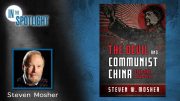
So does his commitment to striking a balance between faith and reason and a roll-up-your-sleeves work ethic as he easily moves from broadside bursts of “We’ve got trouble!” to revelatory reminders of the providential story and destiny of America and our need to get to work restudying, and yes, reapplying our Judeo-Christian and constitutional heritage of limited government and states’ rights if winning is what we hope for.
Bringing America Home, by Tom Pauken. Chronicles Press/The Rockford Institute, 2010. 208 pages, hardcover.
And here’s some cheery news, though Pauken’s resume spells “R-e-p-u-b-l-i-c-a-n” from start to finish — appointments in the Nixon and Reagan Administrations, State Chairman of the Texas Republican Party, current Chairman of the Texas Workforce Commission under Republican Governor Rick Perry — this is not another lame ‘Go Red Go!’ piece of partisan fiction, about how “Life would be so good if it weren’t for them dang Democrats!”
No, not at all. Thank you Mr. Pauken! Bringing America Home, so far as its drawing on decades of personal Republican Party experience goes, is more of an insider’s indictment of the leadership of that party and how for three decades it has offered nothing more than a false alternative to the Democrats.
Pauken believes Barry Goldwater and Ronald Reagan were true conservatives who were key to a three-decade long legitimate conservative reformation that climaxed with Reagan’s election and first term conservative accomplishments. This victory, however, was abruptly brought to a halt with the selection of George H. W. Bush as Reagan’s running mate, that big “mistake” that led to a three-decade long conservative slump beginning with Reagan’s second term, and that hit rock bottom with the presidency of George W. Bush and his big “mistake” neo-con running mate Dick Cheney.
Pauken doesn’t mince words. The Republican Party has not been and is not now truly conservative. And if true conservatives, such as the Tea Party variety that have given us new hope, want to, hope to truly turn this thing around and save America, the task begins, it must begin with a housecleaning that comes to this: a firm and unflinching resolve to “Just Say No!” Are you ready? As in, ‘Just Say No!’ to Rockefeller Republicans! to Internationalist Republicans! to Neo-Con Republicans! to so-called Free Trade Republicans! to Keynesian and Supply-Side Republicans! to America Greatness Republicans! and finally and especially ‘Just Say No’ to anything Bush! and anything Gingrich!”
Did Pauken leave anyone out? He might have ‘Just [Said] No to the Eastern Liberal Establishment’ and that would have summed it up nicely, because whatever divisions there are in this cabal of pretenders, they all have this in common, says Pauken: a penchant for centralizing power — from the states to the Federal government, from Congress to the Executive or the Courts, and from the United States to the United Nations. He’s right. A bit of a controlled debate if you ask me, with every opposing point of view converging on the same end … the edge of the cliff … and what lies below.
Pauken fearlessly exposes the chief trouble with the last Bush administration and its supporters in the media: “they are Trotskyites” who exited the extreme left of the Democrat Party at an opportune moment (when it was clear the country was swinging Republican) only to further undermine the right with their utopian dream of making “the world safe for democracy” … at the point of a sword … and their, truth be told, failure to abandon any of their humanistic, socialistic, and anti-Judeo-Christian tendencies. He names names and publications.
But moving backward in time, enlightening is his description of how and what happened to Reagan in his second term — always a curiosity to me, because I really do believe Reagan in his heart of hearts was the real thing — and why was it that even Reagan’s first term wasn’t nearly as conservative as promised. George H.W. Bush brought a gang of internationalists with him that immediately took to infighting with Reagan conservatives — providing a healthy balance in policy debates at first, says Pauken — but winning out at last. So vicious was Bush’s assault against anyone who ever committed the unpardonable sin of opposing him that every last Reagan supporter dating back to the 1980 primaries (who since then worked for and stood behind Bush, but to no avail) were shown the door.
Outlined impressively is Bush I’s shady past including his role in kicking Free Taiwan out of the United Nations and putting communist Red China in their place; his “odd” request to move his family to his “beloved” Red China following Watergate; his driving passion for a “New World Order,” and his infamous pledge: “Read My Lips, No New Taxes!” that was instantly betrayed with a massive tobacco tax which he did everything in his power not to call a tax (a tax mostly on the poor, by the way).
Bush II didn’t fare very well either in Pauken’s review. Like Ronald Reagan, George W. made a huge “mistake” in picking his running mate — Dick Cheney. Again Pauken calls it a “mistake” but points out that Bush II, unlike his politically-minded father, was no more than the “ultimate front man.” Do “front men” pick running mates at that level? Does any presidential candidate? Pauken doesn’t directly address that question, but the front man story is interesting. Pauken, who grew up with George W, says Bush never had an interest in politics, never did his own research, and never wrote a speech in his life … never. This remains unchanged, say Pauken. Carl Rove was the man really calling the shots dating back to Bush’s stint with the Texas Rangers, and as Governor of Texas, and finally as President. Rove ran domestic affairs for eight years. Dick Cheney, foreign policy. Bush did a good job of memorizing speeches and believing in nothing.
A few highlights provided of neo-con foreign policy under Dick Cheney includes his taking us to war against Iraq because this was planned and pined for by the neo-cons back to the days of Clinton. And after the data that took us to war was proved fraudulent and they came up with the next excuse (the real one), exporting democracy, Pauken quotes Retired Air Force Intelligence Officer Steve Daskal about what neo-cons mean by democracy:
I remain convinced that “democracy” as being promulgated around the world by American progressives/neoconservatives (and their European counterparts), is not conducive to creating limited, federal, pluralistic, market-oriented nations, but rather will lead to the rise of a variety of populist-dominated states that will have strong Islamist and/or fascist and/or Marxist/Leninist tendencies. What made America free and strong is not “democracy,” but rather a limited Constitutional, federal government with separation of powers, checks and balances, and a host of protections of individual rights against majority power and against the power of wealth and elected office. Democratic elections without all those other structures and guarantees and without a solid Judeo-Christian and Common Law tradition, are not likely to enhance liberty,+ much less establish it.
One example:
Christians have fared far worse under the U.S.-sponsored regime than they did when Saddam Hussein was in power. Under Saddam, Christians generally were left alone and allowed to practice their faith so long as they did not pose a political threat.
No more is that true. A campaign of “liquidation” and “violence” has reduced the 800,000 Christians at the time of the U.S. invasion by one third.
Another example of “democratic reform,” “we have set in motion a battle for political power among competing [Islamic] religious factions.” The Americans are becoming known as chumps by the Shites for supplying them with the weapons they then wage war with against the minority Sunnis. Pauken presents a better plan for dealing with radical Islam and devotes a chapter to it.
Besides painting Bush I as loyal only to Bush I and Bush II as passionate about nothing, Pauken provides plenty of solid nut and bolts economic analysis of how our economy crashed with a big helping hand from Bush II. He focuses on two main issues: why capital and industry fled this country (with a look into regulatory and tax policies) and how a government policy that punished savings and rewarded debt and risky investments led to the housing crisis.
And then let’s not forget that Bush II played Fabian John Maynard Keynes, didn’t he, with the support of Republicans in Congress?
There was so much good information in this book, but most enjoyable of all were Pauken’s chapters on the Cultural War, education, and the need to turn governing back to the states and the people and limited government under our Constitution. It becomes clear that Pauken loves the Bible, the classics, and that Alecksandr Solzhenitsen is a particular favorite. Solzhenitsen, he notes, was told as a boy by an oldtimer why things went so bad with the Russian Revolution, “We have forgotten God,” the oldtimer said. Solzhenitsen later researched the Russian Revolution for decades, and after all that, what was the most succinct conclusion he could give to what went wrong with Russia? It was to echo the oldtimer, “We have forgotten God.”
Pauken, like Solzhenitsen, recognizes that ultimately this is a spiritual war, and Pauken is absolutely convinced it can only be won by people of faith, people of the Judeo-Christian faith of our forefathers, and particularly by American Christians. On one side is atheistic communism and now worse, radicalized Islam, and on the other side Christianity and the Constitution. The trouble is the enemy is fanatically determined and relentless in her efforts. But what of the opposition, a Christian opposition that has become weak and secularized? Something has to change.
Pauken’s book is a must read for several reasons — an insider’s confession about how liberal the Republican Party is might be one; offering a sense of faith and hope is another — but here’s the biggest reason: Bringing America Home caused me to constantly stop and think, jot down notes, copy and memorize quotes, debate some of Pauken’s conclusions, reconsider some of my own, have numerous “Ah-ha!” moments; but above all it inspired me to make promises to myself and God to do better, and to believe, truly believe, that we through our best efforts and God’s providential aid can still win this eternal battle for political, economic, and religious freedom in America.
I give it a big TEN. Go Tom Go!
Steve Farrell is one of the original pundits at Silver Eddy Award Winner, NewsMax.com (1999–2008), associate professor of political economy at George Wythe University, the author of the highly praised inspirational novel “Dark Rose,” and editor in chief of The Moral Liberal.



